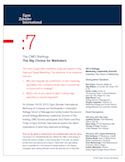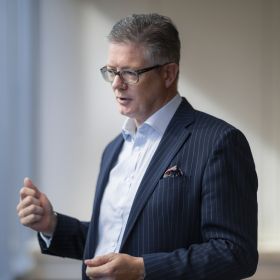On October 24-25, 2012, Egon Zehnder International, McKinsey & Company and Northwestern University’s Kellogg School of Management jointly hosted the second annual Kellogg Marketing Leadership Summit. In this briefing, Rory Finlay of Egon Zehnder International explores the talent implications of what he observed at Kellogg.
The most sought after marketers today are experts in Big Data and Digital Marketing. The questions to be answered now are:
- Who will integrate the proliferation of new marketing specialties into a coherent whole that is consistently on brand and on strategy?
- Which role do you intend to play? Cutting-edge specialist, or overall integrator?
Even as the game is transformed, the fundamentals stay the same.
The recent U.S. Presidential election offered the CMO a vivid analog of where the world is headed. In the closing days of the race, as political pundits were proclaiming the contest a “dead heat” and speculating about a possible tie in the Electoral College, experts in the Obama Campaign were making effective (some say decisive) use of Big Data, determining with unprecedented precision which voters were the key to victory and how to get those crucial slices of the vote out on election day. Many factors contributed to the incumbent’s surprisingly easy win, but sophisticated mining of Big Data was among the most significant. The lesson should be lost on no marketer going forward.
Big Data and Digital Marketing certainly loom large in the minds of the marketers who gathered at Kellogg. The consensus at the CMO Summit was that the game has been transformed. Consumers used to be anonymous. Businesses marketed to large demographic groups, differentiated by lifestyle attributes. But increasingly, marketing now targets individual consumers whose behaviors and preferences can be known and predicted with remarkably nuanced precision. At the same time, Digital Marketing is vastly increasing the number of consumer touch points. Much like those Big Data analysts working feverishly through the final hours of the U.S. Presidential campaign, the marketer’s challenge today is to figure out how to make the right offer to the right consumer at the right touch point, at exactly the right point in time. Increasingly, that is what it takes to win consumers’ share of mind and ultimately pocket.
Yet even in the midst of that profound change, the marketers at the CMO Summit repeatedly stressed that the fundamentals of marketing remain the same. The ends are still to build your brand, create consumer awareness, and earn trial, repeat purchase, preference and advocacy – just as the goal of an election campaign is to enamor voters with your candidate, persuade them to go to the polls and pull the right lever, and also influence others to do the same. In marketing and politics alike, the ends are timeless. The revolution is all about the means.
As CEOs place a premium on specialized marketing talent, the fundamentals could suffer.
Many of the CEOs we know are acutely wary of falling behind the Big Data and Digital Marketing trend, which they know is fast moving, carries vast strategic weight, and is largely outside their expertise. Each day presents new ways to spend the company’s marketing dollars. Yet when it comes to deciding whether to devote money to running a new Super Bowl ad or chasing a breakthrough in SEO, neither CEOs nor their most senior and trusted marketing advisors truly feel qualified to make the call. We hear CEOs saying, in essence: “I’m pouring money out to agencies who say they can make our company a player in the digital world, but our team lacks the expertise to judge whether those marketing investments are sound. Can you get me a CMO who truly understands this medium?” As a result, scores of CEOs are now actively pursuing a very finite pool of senior marketers who are demonstrably proficient at pushing the cutting edge.
However, in the scramble to keep pace with change, few companies are contemplating the tradeoffs they are making. Marketers who can plug holes in the company’s mastery of Big Data, Digital Marketing and social media may lack experience and proficiency in building brands, in crafting marketing strategies to drive growth in traditional companies, or in leading big teams. No doubt, some will also struggle to mesh with a more traditional company’s business culture. In that case, the CEO’s prized new marketing wizards may wind up working essentially in their own silos, separate from traditional marketers, without any overall integration of their efforts. The brand will then fragment. The fundamentals will suffer. Consumers will notice. Critical opportunities will be lost.
You have a big choice to make, and it’s up to you to make it work.
With that danger in mind, we believe many CEOs will soon be seeking a new breed of CMO who can knowledgably integrate cutting edge marketing with traditional marketing fundamentals, and effectively orchestrate the increasingly diverse array of crucial marketing specialties.
The confluence of events suggests, then, that if you want to be a highly sought after marketing leader over the next five years, you have an important choice to make. You can increase your value by honing your credentials as a cutting edge expert. Or you can prepare yourself to serve as the overall integrator of the marketing function in all its modern complexity.
The latter course may be more of a long game, but we believe it is the new path to executive leadership in marketing, as opposed to being a highly prized senior marketing specialist operating a level or two down. So if you see yourself in no role short of the CMO, and your current credentials are predominantly traditional, you want to garner enough experience working in the new frontiers of marketing to demonstrate you are prepared to guide and optimize a company’s full range of marketing investments. Conversely, if you are currently expert in a coveted but narrow marketing specialty, you need to put yourself in an environment that will round out your experience and skills. In both instances, that probably means working in a business that is quite different from where you are now. The fact is, at this stage of the game, there is no one-stop shop for learning everything you must know to be CMO.
Access the full paper CMO Briefing No.7: The Big Choice for Marketers.






